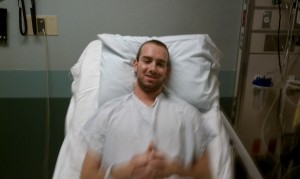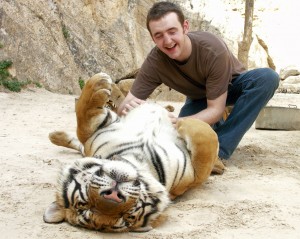Me and my tiger
I often describe the process of my own recovery from childhood sexual abuse as a little bit like being roommates with a gigantic cat, like a panther or a tiger. For many years, the cat simply slept, all the time—it took up an enormous amount of space, but it just slept.
My abuse happened during my junior high and high school years, and my first approach was to just ignore it, which worked really well for decades. I was very successful in high school and college, although I often wasn’t very happy, but to be honest, being successful seemed more important to me back then than being happy. I thought the cat might just sleep forever if I tiptoed around him carefully enough. And the cat slept well into my 30’s.
 Then came an interesting string of events. I was diagnosed with a type of cancer I was not expected to survive, and mentally began to prepare to die. Very fortunately for me, I survived without recurrence (that was almost 20 years ago now) but the event was, as you might imagine, traumatizing. It left some debris, and I did some work with a therapist around PTSD for survivors.
Then came an interesting string of events. I was diagnosed with a type of cancer I was not expected to survive, and mentally began to prepare to die. Very fortunately for me, I survived without recurrence (that was almost 20 years ago now) but the event was, as you might imagine, traumatizing. It left some debris, and I did some work with a therapist around PTSD for survivors.
During the course of that therapy work, it came up that I had been abused when younger, and I mentioned it, and she heard me, but somehow there was no traction to that subject for either of us. I didn’t feel like really getting into it, she didn’t push me to pursue it, so the cat just rolled over, yawned, and went back to sleep.
 The next event was September 11, 2001, which I experienced on the ground in Manhattan, followed almost immediately by some very, very stressful events in my marriage (I suspect the two were related.)
The next event was September 11, 2001, which I experienced on the ground in Manhattan, followed almost immediately by some very, very stressful events in my marriage (I suspect the two were related.)
Those of you who know about trauma and PTSD know that events are cumulative. They can pile on top of each other.
And so the cat woke up.
I was not self-aware enough at the time to realize it, but I felt angry and afraid all the time for a few years after 9/11. I woke up that way and I went to sleep that way. I began to eat more, sleep more, drink more (way more) than I had.
During this period of time, my relationships with men in positions of authority were plagued with conflict. In nearly every encounter with a man in authority I would feel either angry or afraid. It was years before I realized that the reason I always felt out of breath when talking with my boss is that I was having a full-blown fight-or-flight reaction every time I sat in his office.
When I learned to pay attention, I finally noticed my pounding heart, compounded by the fact that I was holding my breath, but I lived for years during this period without ever noticing my physical body, how it was, or what it was doing.
Once my therapist and I talked our way through everything else that was going on in my life, and as things were on an upturn for both me and my marriage, slowly improving, it felt to me like I was running out of things to talk about. And one day I said to him, “you know, maybe we should talk about this thing that happened when I was younger.”
 And he wisely said, “well, let’s just talk about talking about it, because there could be both cost AND benefit to opening that subject. It can be difficult work.” And ultimately, we decided to get the tiger up, put him on a leash and take him for walk.
And he wisely said, “well, let’s just talk about talking about it, because there could be both cost AND benefit to opening that subject. It can be difficult work.” And ultimately, we decided to get the tiger up, put him on a leash and take him for walk.
So I talked and talked and talked. I told my story, several times, dozens of times, a hundred times. I joined a support group of other men who had had the same experience. I talked to my parents, my family, my friends. I told my story to anyone who would listen to it. I came out as a guy who had been abused. I went public. The cat was out of the bag.
The biggest piece of what I call the “talking and thinking” phase of recovery came about a year in. Have you ever been at work, and felt an illness coming on, like a flu, or a stomach bug, and you just know that in an hour or two you’re going to be very, very sick—you can feel it? You know that in two hours you’re going to want to be lying down or near a bathroom. Well, I had this very same experience with emotions.
I was at work, about 1:00 in the afternoon, and felt, from a distance, emotions coming at me where I knew in a couple hours I was going to need not to be at work. And I told my assistant I wasn’t feeling well and went home, and laid down on the bed and I waited.
I don’t know if you’ve ever had the flu so bad that you though, “my God, I feel so sick, I feel like I could die.” Well, when these emotions hit, my first thought was, “I feel so bad I might die from this.” And I remember telling myself, “emotions can’t kill you, and they don’t last forever, so all you have to do is wait it out.”
And I felt that way for 4 or 5 days, I felt so bad that I felt like I might die. And what I felt was what it was to be abused; what it felt like to have that experience, and the impact of that experience.
And after 4 or 5 days, I had felt my feelings, absorbed them, and I felt better. I felt the way you do after a serious flu; I felt a little wobbly, a little weak, but definitely better. I think, of all the years of talking, those 4 or 5 days, that was the work. That was the actual recovery. The point of all of that for me was just to become strong enough to open up to feel what actually happened.
So then I kept talking about my experience and telling my story until one day, a voice inside of me said, “you know what? Even I am tired of hearing this story. I’m tired of hearing myself talk about this. I’m done talking. I’m talked out.”
 So what else is there to do besides talk about it? Well, I had my first massage, clinical massage, nothing fancy, nothing erotic, just massage. I interviewed six potential masseurs as though I was examining them for security clearance for the CIA. Eventually I took myself to my first massage with great earnestness as though I was going to a medical procedure. I was terrified.
So what else is there to do besides talk about it? Well, I had my first massage, clinical massage, nothing fancy, nothing erotic, just massage. I interviewed six potential masseurs as though I was examining them for security clearance for the CIA. Eventually I took myself to my first massage with great earnestness as though I was going to a medical procedure. I was terrified.
I laugh, because in the beginning I approached massage like some sacred ritual of recovery to be entered into without any lightness, and I so I would go to massage and lie down on the table as though I was attending my own circumcision. And it was some sacred ritual on some level, but by the end of two years I was bounding into the room like a puppy, tearing off my clothes before the masseur could leave the room, refusing to be covered up in sheets like a mummy and loving being naked in my body and getting rubbed. After a couple dozen of them, getting a massage got to be as difficult as wolfing down a piece of pie.
 What else is there to do besides talk about it? Yoga. Until I tried it, I hated the idea of yoga, although it had been suggested to me a dozen times by people who knew better. Yoga is a piece of the most powerful part of recovery for me.
What else is there to do besides talk about it? Yoga. Until I tried it, I hated the idea of yoga, although it had been suggested to me a dozen times by people who knew better. Yoga is a piece of the most powerful part of recovery for me.
I’ve lived most of my life in my head. Because I’ve been an academic all my life, I have gotten paid to spend a lot of time in my head. For many academics, the body consists of a head with an unnecessarily complicated life-support system underneath it. The only reason the unnecessary part of the body (from the neck down) evolved was to be able to transport the head from location to location.
So there was one yoga class, several weeks after I started, where during shavasana at the end of the class, as I took a breath and relaxed, I fell out of my head into my belly. It happened in one moment, on a Thursday night. It was like dropping a bowling ball onto a hardwood floor. I fell back into my body, in one moment, a body I hadn’t really visited since I was a little kid, and I have been in my body ever since that moment. There is a distinct before/after, black and white quality to that one experience.
I have done lots of yoga. I’ve done naked yoga. I’ve done partnered yoga. I’ve done naked partnered yoga. I’ve explored tantra. I started to love working out, not because it makes me look a certain way but because it is time I get to spend alone in my body. The experience of falling into my belly in yoga has allowed me to work on recovery from my belly as well as from my brain.
Also, as I stopped being angry and afraid all the time, I experienced a profound shift in my personality: I became kind. The change was most visible in my interactions with others, but it was most profound in my interaction with myself, because when we become kind towards ourselves, we no longer have to look away from the wounded parts of ourselves and we start to be able to see clearly. It became possible for me to work with my own tiger in a really deep and compassionate and engaged way.
 So now that I have started to love spending time in my body, not just my mind, my practice of recovery moved towards creating situations where I can really explore being in this body. The body I got fascinated with is my 13-year-old body, what I call “puppy body.” If you think about puppies, they gets lots and lots of contact and touch and affection without any of it being about sex, and that’s where I find a lot of healing right now. The interest in that body was what led me to create for myself the practice that eventually evolved into Touch Practice.
So now that I have started to love spending time in my body, not just my mind, my practice of recovery moved towards creating situations where I can really explore being in this body. The body I got fascinated with is my 13-year-old body, what I call “puppy body.” If you think about puppies, they gets lots and lots of contact and touch and affection without any of it being about sex, and that’s where I find a lot of healing right now. The interest in that body was what led me to create for myself the practice that eventually evolved into Touch Practice.
I missed puppyhood on some level, because there was other stuff going on when I was a puppy. Things got very sexual very fast. So despite the fact that I’m now a card-carrying member of AARP, I’ve managed to create environments for myself where I get hugged and cuddled and have lots of non-sexual body contact with people. I have at least a dozen close friends who are partners in my recovery to the extent that they hug me or hold me or rub my head when they see me. My close friends know that I need and want to be touched when we see each other; it’s part of our friendship and it’s part of my recovery.
The symbolic importance of this for me is that while talking and thinking types of recovery work are essential, my own wounding was not caused primarily by talking or thinking, it was caused by physical touch—the wrong touch at the wrong time. So using physical touch—the right touch at the right time—has been an incredibly powerful tool in my recovery. I have been able to talk and think my way into feeling better, emotionally, about what happened, but I have had to touch my way back into being in my body again.
 So back to this big cat. We are no longer suspicious and fearful of each other; instead our relationship now is marked by curiosity and exploration. We mostly play with each other now. We wrestle, playfully, affectionately, no longer afraid of each other, fully awake.
So back to this big cat. We are no longer suspicious and fearful of each other; instead our relationship now is marked by curiosity and exploration. We mostly play with each other now. We wrestle, playfully, affectionately, no longer afraid of each other, fully awake.
I have no doubt that that this big cat is going to be my roommate for life. He’s not going away, and he’ll always take up a certain amount of space. But lately, he’s been pretty fun to hang out with, and most importantly, he plays well with puppies.
Thanks for reading.
There is one space still available in the Spring 2014 Asheville retreat!
Click here for more information!
Have thoughts you’d like to share?
Touch Practice is a sacred practice for me, and part of that is keeping confidences sacred. While a name and e-mail address are required to post a comment, feel free to use just your first name, or a pseudonym if you wish. Your e-mail address will never be seen by or shared with anyone. It is used to prevent spam and inappropriate comments from appearing in the blog. I’d really like to hear from you!














Kevin,
Powerful powerful story! Thank you for sharing your journey of recovery, of awakening to yourself to your body. You are a wonderful example of how healing can happen.
Jeff
Thanks for reading, Jeff!
Thank you for telling your story. It helped me to remember that regardless of how scary events outside ourselves can be, fear of feelings is always greater and it’s always the bigger challenge. This plays out with me even with joyful feelings – fear – that if I let myself really let go into it, I’ll never have it again. So powerful to be reminded that grounding back in the body is the path to more freedom.
Kevin, I am so deeply grateful for your willingness to introduce me to your tiger and to show me a possible future I never thought imaginable. Hugs, Chris
Dear Kevin,
Three things stood out for me in this text:
1st – I love your sense of humor;
2nd – This exerpt: “…while talking and thinking types of recovery work are essential, my own wounding was not caused primarily by talking or thinking, it was caused by physical touch—the wrong touch at the wrong time. So using physical touch—the right touch at the right time—has been an incredibly powerful tool in my recovery. I have been able to talk and think my way into feeling better, emotionally, about what happened, but I have had to touch my way back into being in my body again,” plus the article mentioned in its link, are the most interesting and reasonable accounts about sexual abuse treatment and recovery that I have read or seen so far;
3rd – Your story would make a great cult movie to be celebrated in a film festival, or maybe even a major Hollywood drama, it all depends on having the right screenplay. The reason I think so is, in my view, this is the king of original story more people need to know about.